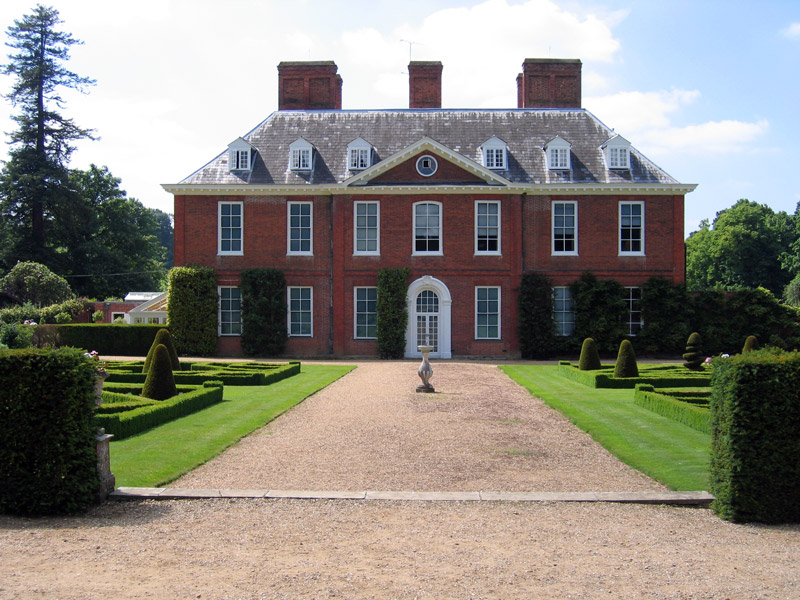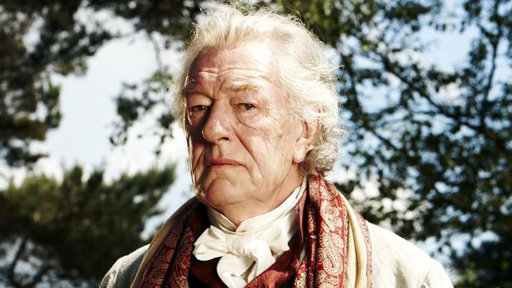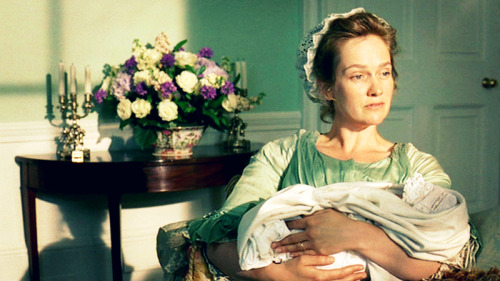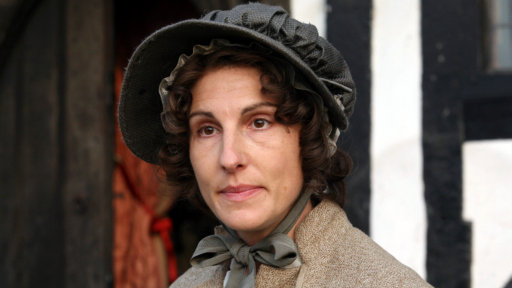Emma by Jane Austen has the unfortunate reputation of being the most boring high school and college novel to study. At first, I was not enthusiastic about studying it at all; I tried reading it in the summer holidays before year eleven, but couldn't really hack into it. But now we're actually studying it, I'm beginning to really enjoy it.
One thing that puts Emma off modern audiences is that it's character driven, not plot driven. This is true for most of Austen's novels, because of the genre in which she write (comedy of manners) - this has established her reputation as a sharp critique of human personality and social interaction. However, Emma is by far the most character-driven Austen novel, made even more difficult to swallow because a) it happens in a world so far removed from our own b) most of the exciting stuff appears to have happened before the book (deaths, weddings, adoptions etc.) and c) nothing much actually happens in Emma; it's a personal discovery, not a physical journey.
Often people run into trouble when studying novels because they approach it in the wrong manner. When studying a novel, it is important to read it differently than if you were reading it for pleasure. Before studying it always pays to read the book cover to cover, or if this is too difficult to swallow read a synopsis (Wikipedia is always good for plain, sensible language) and watch an adaptation before attempting to read - this gets the storyline in your head and puts faces to characters. Newer adaptations are always easier on the modern eye, but the trade off is that they are often heavily compressed and romanticized - older adaptations from the traditional documentary era are normally meticulously faithful to the text, but are often long winded, badly acted, slow-paced, endlessly boring and old fashioned. For Emma, I've found that the 2009 BBC adaptation is excellent as it is set at a brisk pace, but is extremely faithful to the novel and the characterization is excellent. Remember, when you study a novel you are studying the text, not the plot - and this is why Emma is considered such a good study novel, because the language and characters are so much more important than the plot. So don't be afraid to read spoilers, or flip to the back of the book so that you know that it finally ends sooner or later.
I'm adding pictures from the recent 2009 adaptation because I think it's important to have a vivid image of what things look like inside your head - and what they exactly look like is neither imperative to the novel or the study of it.
SETTING: Emma is set in the country - where most of the gentry resided when not 'at business' in 'town' (London) - near a fictional town called Highbury, which is in Surrey (which is real). Most of the characters are of gentry class, or former members of the gentry.
CHARACTERS:
HARTFIELD ESTATE - Residence of the Woodhouse Family.
The Woodhouse Family is, aside from the Knightley Family, the most socially elite family in Highbury. Based on Emma's dowry, the annual income of the Woodhouse Family is about 20,000 pounds (about 2 million in today's money). The Woodhouse family home, Hartfield, is considered the heart of Highbury and attracts all the worthy company in the neighbourhood - Mr Knightley walks there almost every day. The characters in Emma from the Woodhouse family are Mr Woodhouse, Emma Woodhouse and Isabella Knightley.
Miss EMMA WOODHOUSE
Emma Woodhouse is the heroine of the story, and is Jane Austen's wealthiest and most socially elite heroine, being the heiress to 30,000 pounds (about 3 million) (in comparison, Lizzy Bennet's dowry is only 1000 pounds, or 10,000 pounds in today's money). Emma is twenty-one and kind-hearted, pretty and intelligent, but also spoiled, meddlesome and haughty, spending much of her time meddling in the love lives of the people of Hertfield.
Mr WOODHOUSE, Esq.
Mr Woodhouse is a wealthy widower and father to Isabella and Emma Woodhouse. A pessimistic, old-fashioned hypochondriac, Mr Woodhouse is an affectionate, if overbearing father with little patriarchal authority who delights in spoiling his children and grandchildren. He is also 'gently selfish', unable to see things from another point of view.
Mrs ISABELLA KNIGHTLEY (Miss ISABELLA WOODHOUSE)
Isabella Woodhouse is Emma's elder sister and at twenty-eight is seven years her senior; married to John Knightley and mother to five children: Henry, Little John, Bella, Little Emma and Little George. She is motherly and domestic, and not Emma's intellectual equal.
DONWELL ABBEY - Residence of the Knightley Family
The Knightley Family is the most socially elite family in Highbury, based in the family residence of Donwell Abbey, which is only a mile off from Hartfield. When the book begins only George Knightley, as the eldest son, lives at Donwell - his younger brother and family, as is custom, move to town to on their own estate. The characters in Emma from the Knightley family are Mr Knightley, John Knightley, Isabella Knightley, and John and Isabella's children Henry, Little John, Bella, Little Emma and Little George.
Mr GEORGE KNIGHTLEY, Esq.
Mr Knightley is the wealthiest gentleman in Highbury, being the master of the richest estate in Highbury. A close friend of the Woodhouse family, he is the brother-in-law of the Woodhouse sisters through is younger brother's marriage to Emma's sister. About thirty-seven at the beginning of the novel, Mr Knightley is wise, compassionate, intelligent, gentle and paternalistic, and serves as a father figure to Emma, his oldest friend, whom he deems silly and immature.
Mr JOHN KNIGHTLEY, Esq.
John Knightley is Mr Knightley's younger brother, and lives in a London estate with his family in the absence of an inherited property. He is an indulgent family man who gives in to his family's desires for holidays, outings, visitors, and visits to Highbury at the expense of his desire for a quiet family life. Like Emma, he has a shrewd eye for matchmaking, but does not often interfere.
RANDALLS ESTATE - Residence of the Weston Family
Randalls Estate is the neighbouring property of Hartfield, being the new residence of the recently wealthy Mr Weston.
MR WESTON, Esq.
A sanguine, placid, optimistic man, Mr Weston is a widower and father of Frank Churchill. Married beyond his means to a spoiled, wealthy young woman who ruined both herself and her husband before her death, Mr Weston is nonetheless a well-liked and respected man in Highbury, especially after his unexpected marriage to Emma's former governess Anne Taylor.
Mrs ANNE WESTON (Miss ANNE TAYLOR)
Anne Taylor is the former governess of Isabella and Emma Woodhouse, appointed after the death of their mother. To the distress of Mr and Emma Woodhouse, Miss Taylor marries Mr Weston and moves half a mile away to Randalls Estate.
Mr FRANK WESTON CHURCHILL
Flamboyant, fashionable and fiery, Frank Churchill is the son of Mr Weston and the nephew of his aunt and guardian, Mrs Churchill. Confined by his sickly but controlling aunt, he has grown into a good-natured but impatient, reckless, impulsive and accidentally selfish man.
Mrs CHURCHILL
The estranged sister of Mr Weston's first wife, Mrs Churchill adopts Frank Weston and keeps him away from his father and from Highbury, whom she sees as below the prosperous Churchill family.
THE VICARAGE - Parsonage of the Elton Family
Most country towns like Highbuy had a single church, with a modest house provided for the vicar called a parsonage. A vicar or clergyman was a good catch for a modest girl, but most aimed to improve their fortunes through marrying higher, using their religious education as social leverage. The residents at the vicarage are Mr Elton and his wife, Augusta.
Mr PHILIP ELTON
An ambitious, charming and charismatic young vicar; an eager social climber with sights on a beautiful bride with a large dowry; i.e. Emma.
Mrs AUGUSTA ELTON (Miss AUGUSTA HAWKINS)
A moneyed young woman from Bath, Mrs Elton is pretensious, irritating, flamboyant, condescending and patronizing; an equal match for her husband. She treats the country folk with disdain, even though she is amongst her social superiors with members of the landed gentry. Her treatment of her social inferiors Harriet Smith and Jane Fairfax inspires the people of Hartfield to be more sympathetic towards them.
THE BATES FAMILY
The Bates Family was formerly a member of the gentry before they fell on hard times and plunged, without a solid income or a patriarch, into relative poverty. The characters in the book belonging to the Bates family are Mrs Bates, Miss Bates and Jane Fairfax.
Miss BATES
A talktative, dimwitted but kind-natured spinster, the eldest daughter of Mrs Bates and the aunt of Jane Fairfax.
Mrs BATES
The mother of Miss Bates and the grandmother of Jane Fairfax; she does not talk. Ever. As in, never.
MISS JANE FAIRFAX (Mrs JANE WESTON CHURCHILL)
The orphaned niece of Miss Bates and only granddaughter of Mrs Bates, Jane Fairfax was sent away to become a ward of a wealthy family friend. Unlike Emma, she has no fortune of her own and so must become a governess, even though, as a gentleman's daughter, it is below her station. Shy, reserved and passive, Emma is jealous of Jane because of her accomplishments and the sympathy she attracts due to her poverty.
OTHERS:
Miss HARRIET SMITH (Mrs HARRIET MARTIN)
The 'natural' (illegitimate) daughter of someone-or-other, Harriet i had been brought up at Mrs Goddard's school in Highbury as a parlour boarder - a wealthy student who is elevated above the rest and given special priviledges. Despite her illegitimacy she has been comfortably brought up, with her anonymous family providing her generously, but she has no dowry and must stay at the school or leave and earn her keep as a governess. She is pretty and good natured, but unsophisticated and not intellectual. After the departure of Anne Taylor she becomes Emma's protege and companion; Emma is convinced that she deserves to be a gentleman's wife, and goes about making sure that happens.
Mr ROBERT MARTIN
A gentleman-farmer who is considered by Emma to be her, and therefore Harriet's social inferior. He is intelligent, sensible, practical, warm and generous, but Emma is convinced that he lacks class despite evidence otherwise. He lives with his sisters and is in love with Harriet Smith.
SYNOPSIS:
After the death of their mother, Isabella and Emma Woodhouse grow up in the comforts of Highbury with their affectionate father and doting governess, Anne Taylor. Other children in Highbury are not so lucky; after the death of his mother, Frank Weston is adopted by his aunt Mrs Churchill and removed from his father and from Highbury. After the death of both her parents, Jane Fairfax's well-meaning aunt sends her to be the ward of a wealthy family friend, and she grows up away from her family and from Highbury as the companion and chaperone of a wealthy girl, knowing that she will eventually have to leave their hospitality and make her own way in the world.
After her sister Isabella's marriage to family friend John Knightley, twenty-one year old Emma Woodhouse finds herself mistress of her father's house, her hypochondriac father's chief carer and enjoys the luxury of country gentry living and the assurance of independent wealth. Because of this, Emma is uninterested in marriage, instead preferring to play matchmaker to the residents of Highbury.
After the marriage of her governess Anne Taylor to their recently-wealthy neighbour Mr Weston (for which Emma takes credit for arranging), she takes on the pretty, unsophisticated parlour boarder Harriet Smith as her companion and protege. Despite Harriet's lack of fortune and family, illegitimacy and unsophisticated manner, Emma's class prejudice makes it inconceivable to her that any friend of hers deserves anything less than to be a gentleman's wife.
Emma attempts to match Mr Elton, the dashingly handsome vicar with Harriet, and convinces her to reject a marriage proposal from gentleman-farmer Robert Martin. Mr Knightley, Emma's brother-in-law and father/brother figure, chastises her for being narrow minded about Robert Martin's situation and unrealistic in her matchmaking for Harriet Smith, pointing out that Mr Elton is thoroughly aware of his good looks and social standing and would wish to seek a rich bride. Emma ignores this, and continues to encourage what she sees as a growing attachment between Mr Elton and Harriet, and Harriet becomes infatuated with Mr Elton and his charms.
Soon, however, Emma realizes the truth of Mr Knightley's words when Mr Elton instead professes his love to Emma and attempts to propose, despite her protests that Harriet is a much more suitable candidate. Thus Emma's attempt at matchmaking ends up with all three parties hurt; Mr Elton is offended at the idea of Harriet being considered his equal, and leaves Highbury only to return with the wealthy Augusta Hawkins from Bath in tow as his bride; Emma is humiliated at her misunderstanding and furious that Mr Elton's attraction was purely based on her wealth and social standing; Harriet is heartbroken at being rejected in favour of her friend and then abandoned completely by Mr Elton.
Whilst attempting to comfort Harriet, Highbury encounters two newcomers: Mr Frank Churchill, Mr Weston's son, and Jane Fairfax, Miss Bates' niece. Emma is attracted to the fashionable and flamboyant Frank Churchill and spends much time with him, at the expense of her friendship with Mr Knightley, who is accustomed to walking to Hartfield every day to spend time with Emma, who is sixteen years his junior. Mr Knightley is suspicious of Frank's apparently unusual behaviour - such as travelling all the way to London for a haircut - and it is implied that he is jealous of Frank and his relationship with Emma. Emma receives Jane Fairfax with less enthusiasm; despite her lack of funds Jane is beautiful and accomplished, and Emma is both irritated by her cool reserve and jealous of her accomplishments.
Mr Knightley, compassionate by nature, is sympathetic and caring towards Jane Fairfax, and Mrs Weston suspects that it is due to a romantic attachment; Mr Knightley being relatively old and unmarried, is wealthy enough not to require a rich bride but socially elite enough to desire a well-bred wife. Mrs Weston and others also assume that Frank and Emma are becoming romantically attach; Emma resists both assumptions, as she cannot imagine Mr Knightley taking a wife and imagines Frank to be a potential suitor for Harriet.
Mrs Elton turns out to be the most disagreeable woman imaginable, looking down on country folk and country living, even though Emma and Mr Knightley are arguably her social and financial superiors. Because of her condescending attitude towards Jane Emma begins to treat her with more kindness and respect; at a ball Mr Knightley offers to dance with Harriet after she is humiliated by Mrs Elton and snubbed by Mr Elton. The next day Frank saves Harriet from gypsy beggars and brings her to Emma; Harriet tells Emma that she has fallen in love with a man who saved her and is above her station, and Emma assumes she means Frank.
Knightley begins to suspect that Frank and Jane may have a secret understanding and warns Emma not to become too attached to Frank; Emma ignores him and, on an outing to Box Hill she flirts with Frank and insults Miss Bates, who is kind-hearted but dimwitted and incessantly talkative. Mr Knightley reprimands Emma and she weeps, and attempts to make up for her insult.
After news comes that Frank's aunt Mrs Churchill had died, it is revealed that he and Jane Fairfax have been secretly engaged since before their arrival at Highbury; Frank's attentions to Emma have just been to conceal the engagement, which would not have been approved of by his aunt. Emma is furious that she has, once again, been used; but realizes that she was never truly in love with Frank, and so no real harm has been done. Emma expects Harriet to also be heartbroken at the engagement, but Harriet instead says that she was referring to Mr Knightley, not Frank, and now believes that Mr Knightley returns the favour. Emma then finally realizes that she is in love with Mr Knightley, and has been all along, but due to her own meddling she has lost her opportunity to be with him.
Emma expects Mr Knightley to admit his affection for Harriet, but instead declares his love for Emma, and his disgust at Frank's behaviour. Frank and Jane earn the forgiveness of the Westons and the Woodhouses and marry; Emma and Mr Knightley get engaged, and Robert Martin proposes a second time to Harriet, who accepts. The novel ends with the marriage of Harriet and Robert Martin and Emma and George Knightley.
And there you have it.
THINGS TO NOTICE IF IT GETS REALLY BORING:
1. The relationship between Emma and Knightley
This is perhaps the most interesting element of the book - the curious, kind of paedophilic mildly incestuous relationship between Emma and Knightley. I don't really see it that way, but there are Knightley haters that do.
Mr Woodhouse is not the archetypal patriachal backbone of his family, being elderly, frail and an obsessive hypochondriac; Mr Knightley is therefore introduced as both a father substitute and an elder sibling substitute, especially with the marriage and departure of Emma's sister Isabella. Mr Knightley is introduced as being wealthy, sensible, fatherly and, well, old - sixteen years older than Emma. This age gap is further widened by the fact that his younger brother is married to her elder sister. He also takes on the role of a parent, chastising and disciplining Emma when necessary. In the end, though, Knightley is the only one of Emma's love interests who truly cared for her; Mr Elton was only interested in her money and Mr Churchill only used her to cover up his secret betrothal. However, Knightley makes no secret of his attraction to Emma, claiming that he 'loves to look at her' and 'has been in love with her since she was thirteen years old' - this is slightly creepy in an Austen book. What do you think? Should Emma really marry her daddy substitute?
More to come...I'm gonna go hit the sack.


















No comments:
Post a Comment